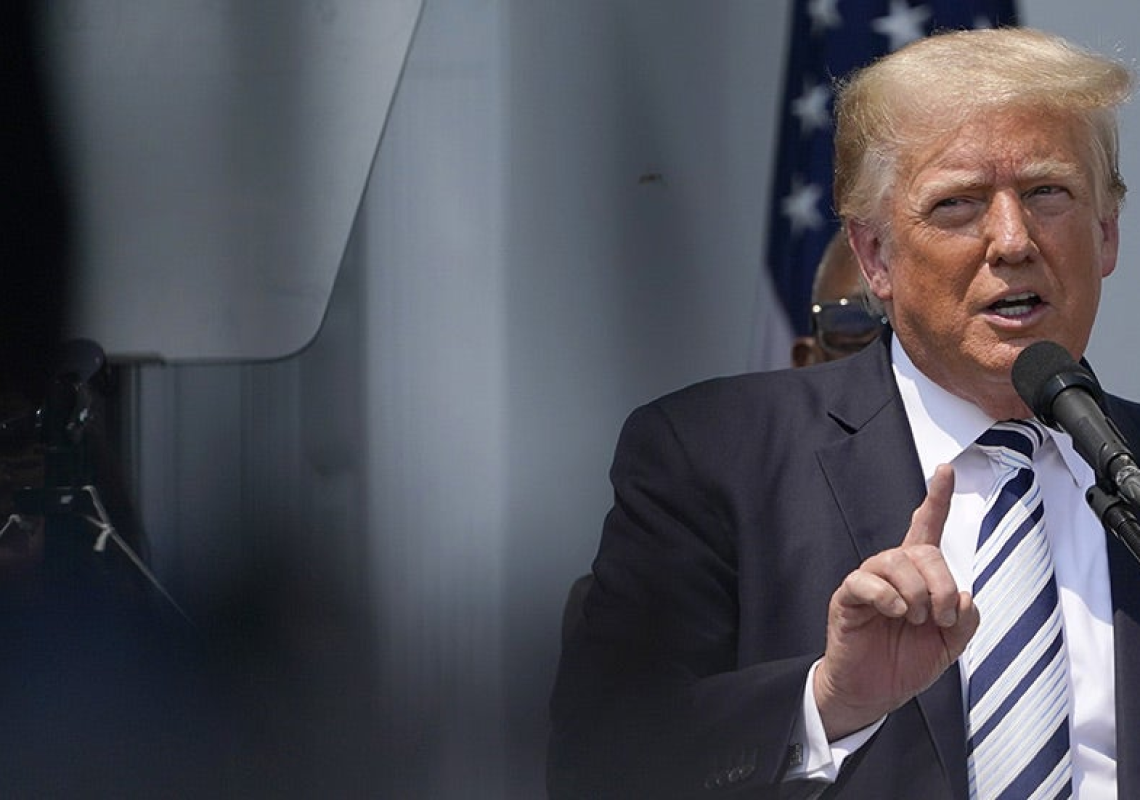© 1998-2021 Nexstar Media Inc.
All Rights Reserved
An appeals court ruling this week that dealt another blow to former President Trump Donald Trump29 percent of GOP support efforts to charge accused Jan. 6 rioters: poll Trump warns Alaska GOP governor he’ll revoke endorsement if he backs Murkowski Michigan Republican John James ‘strongly considering’ House run MORE‘s efforts to shield White House records from the House Jan. 6 select committee has laid the groundwork for a Supreme Court test on the former president’s authority to invoke executive privilege.
Donald Trump29 percent of GOP support efforts to charge accused Jan. 6 rioters: poll Trump warns Alaska GOP governor he’ll revoke endorsement if he backs Murkowski Michigan Republican John James ‘strongly considering’ House run MORE‘s efforts to shield White House records from the House Jan. 6 select committee has laid the groundwork for a Supreme Court test on the former president’s authority to invoke executive privilege.
Trump is likely to ask the Supreme Court to review the D.C. Circuit decision that found he had failed to put forth a valid argument for why the judiciary should interfere with the executive branch’s decision to cooperate with a congressional investigation.
How the Supreme Court responds — and how quickly it rules — will likely have downstream effects on the House committee’s investigation and the former president’s efforts to slow it down.
A Trump spokeswoman responded to the decision Thursday night, indicating that he intends to seek Supreme Court review.
“Regardless of today’s decision by the the appeals court, this case was always destined for the Supreme Court,” the spokeswoman, Liz Harrington, said on Twitter. “President Trump’s duty to defend the Constitution and the Office of the Presidency continues, and he will keep fighting for every American and every future Administration.”
A three-judge panel for the D.C. Circuit rejected Trump’s arguments that the court should block the National Archives from producing records from his administration to the select committee because of his claims of executive privilege.
In a 68-page opinion written by Judge Patricia Millett, the panel said that the former president failed to provide any good reasons why the courts should interfere when the current president provided a reasoned rationale for waiving privilege over the records and the select committee has demonstrated a compelling interest in the information.
“He offers instead only a grab-bag of objections that simply assert without elaboration his superior assessment of Executive Branch interests, insists that Congress and the Committee have no legitimate legislative interest in an attack on the Capitol, and impugns the motives of President Biden Joe BidenBiden, lawmakers mourn Harry Reid 29 percent of GOP support efforts to charge accused Jan. 6 rioters: poll Congress must meet the moment to hold Big Pharma accountable MORE and the House,” Millett wrote in the opinion. “That falls far short of meeting his burden and makes it impossible for this court to find any likelihood of success.”
Joe BidenBiden, lawmakers mourn Harry Reid 29 percent of GOP support efforts to charge accused Jan. 6 rioters: poll Congress must meet the moment to hold Big Pharma accountable MORE and the House,” Millett wrote in the opinion. “That falls far short of meeting his burden and makes it impossible for this court to find any likelihood of success.”
All three judges on the panel were appointed by Democratic presidents.
Like many of the high-profile cases marking the Trump era, the lawsuit against the Biden administration and the select committee poses untested legal questions. But some observers believe that this time around, Trump may have a hard time finding a receptive audience for his claims, even with a 6-3 conservative majority on the Supreme Court.
His lawyers have been arguing that the select committee’s expansive document requests lack any valid legislative basis and that Biden’s waiver of executive privilege over the records poses constitutional harms for the executive branch and its rights to confidentiality.
Some say that conservative jurists, many of whom subscribe to beliefs about maintaining a strong executive branch, would be uncomfortable with the idea of granting a former president even a limited check on the authority of a sitting president.
Jonathan Adler, a law professor at Case Western Reserve University, believes that the Supreme Court could find it easy to pass up the case if Trump asks for its intervention.
“I doubt the Court is likely to get involved here,” Adler wrote in an email to The Hill, saying the panel’s decision was more “restrained” than in past cases where the circuit ruled in favor of the House in disputes with Trump. “While there may be a few justices inclined to intervene, it would not surprise me at all if the Court simply lets this pass.”
Kel McClanahan, an adjunct law professor at George Washington University who filed an amicus brief in the case in support of the select committee, said that even if the court did decide to hear the case, there’s no guarantee it would deliver a victory for Trump.
McClanahan said that Trump’s claims, for instance, would not fit with the belief popular in the conservative legal movement — known as the unitary executive theory — that authority over the entire executive branch is vested in a single person, the sitting president.
“It’s undeniable that if you subscribe to unitary executive theory, then there’s nobody who can second-guess the president. It’s not the ‘unitary executive and former executives theory,’ and so to the extent that a conservative Supreme Court that subscribes to the unitary executive theory — which, to be fair, I don’t think all of the conservative members do — it would be disinclined to find for Trump,” McClanahan said.
Trump and his allies have been fighting the select committee’s efforts to obtain administration records and testimony on multiple fronts.
After receiving a criminal referral from the House last month, the Justice Department charged Trump’s close ally and former White House strategist Stephen Bannon with contempt of Congress for defying a subpoena from the select committee.
And Mark Meadows Mark MeadowsTrump spokesman suing Jan. 6 panel, says he is cooperating with investigation Jim Jordan says he has ‘real concerns’ with Jan. 6 panel after sit-down request Jan. 6 panel seeks sit-down with Jim Jordan MORE, who served as Trump’s White House chief of staff, filed a civil lawsuit against the committee last week challenging the validity of its subpoenas for his testimony and his personal phone records.
Mark MeadowsTrump spokesman suing Jan. 6 panel, says he is cooperating with investigation Jim Jordan says he has ‘real concerns’ with Jan. 6 panel after sit-down request Jan. 6 panel seeks sit-down with Jim Jordan MORE, who served as Trump’s White House chief of staff, filed a civil lawsuit against the committee last week challenging the validity of its subpoenas for his testimony and his personal phone records.
Both of them cited the former president’s claims of executive privilege in their disputes with the committee. How the courts resolve Trump’s case over his White House records could have downstream effects on his allies’ efforts to evade congressional investigators.
While the panel’s decision on Thursday categorically rejected Trump’s effort to shield the White House records, the opinion did not completely close the door on the possibility of a former president being able to shield information from a congressional investigation.
“Given former President Trump’s failure to meet his burden, we need not decide to what extent a court could, after a sufficient showing of congressional need, second-guess a sitting President’s judgment that invoking privilege is not in the best interests of the United States,” Millett wrote.
McClanahan said that the court passed up an opportunity to provide clarity around the scope of Trump’s authority to invoke executive privilege in the face of the select committee’s investigation, giving the former president’s allies room to continue to fight subpoenas with untested legal claims.
“Every time a court creates a test or hints at a test or opens the door a crack, there comes a flood of litigants trying to fit their case into that crack,” McClanahan said.
“Everybody’s going to try and make the right arguments. Meadows is going to try to make the right arguments. Bannon is going to try to make the right arguments. Every single person tied to this whole executive privilege train is going to try and shove their case through the crack in the door that the circuit left open.”
Unless a court ultimately rules that there’s little or no room for a former president to win against a successor’s waiver of privilege, McClanahan said, “this is an invitation for everyone in Trump’s orbit to claim executive privilege.”
John Kruzel contributed.
View the discussion thread.
The Hill 1625 K Street, NW Suite 900 Washington DC 20006 | 202-628-8500 tel | 202-628-8503 fax
The contents of this site are © 1998 – 2021 Nexstar Media Inc. | All Rights Reserved.






